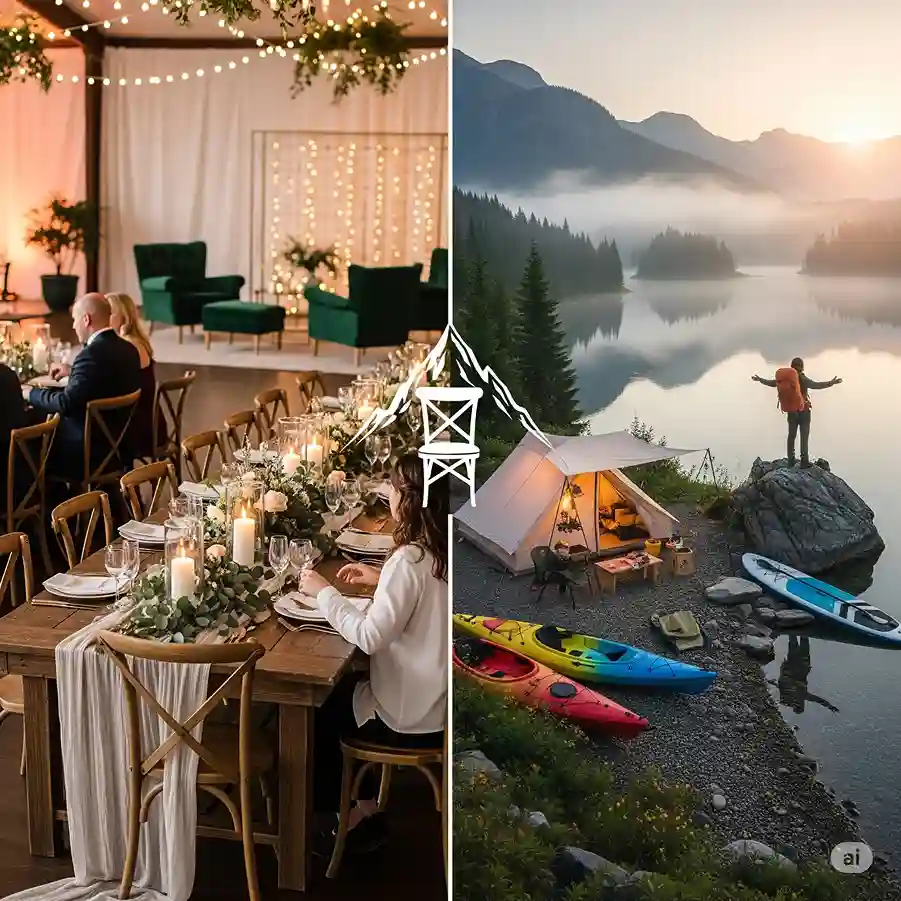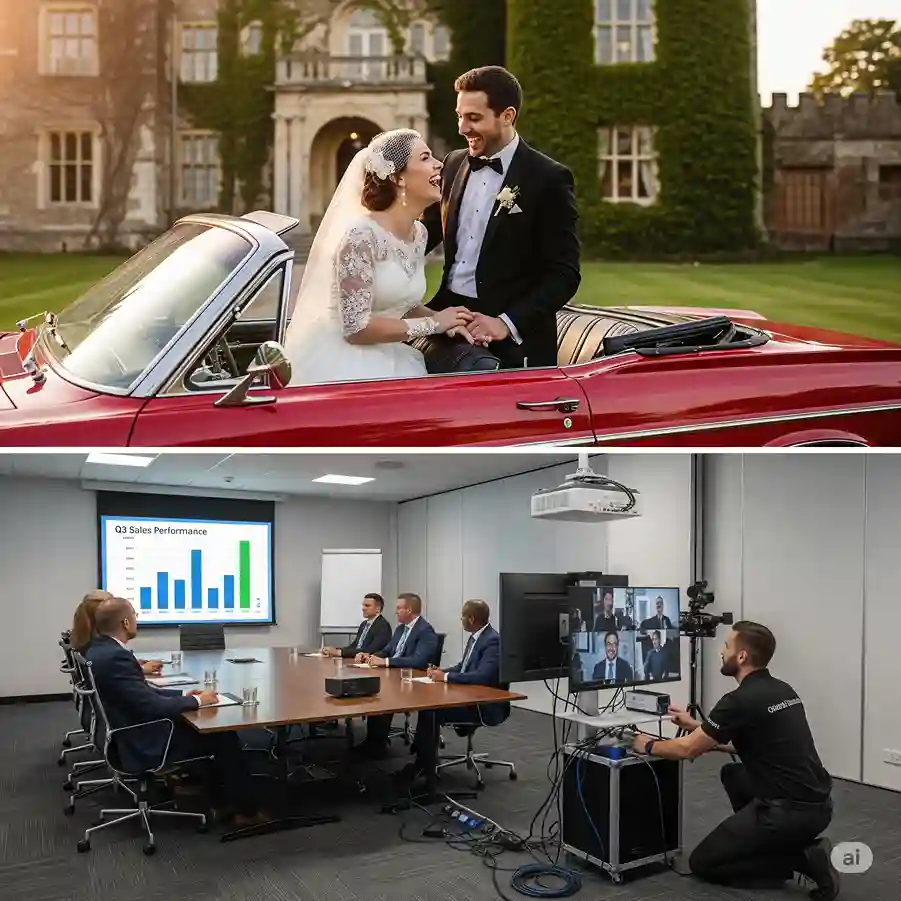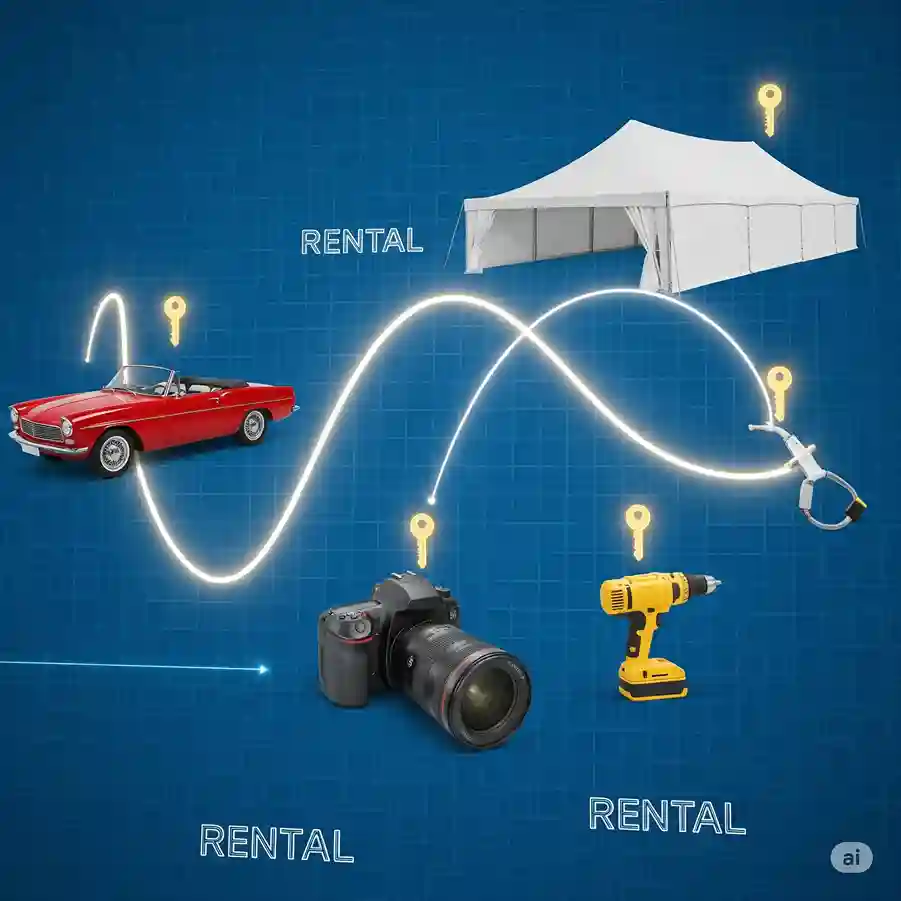Rentals are experiencing a powerful revival in a world where experiences are valued more than possessions. Consumers and businesses today are adopting a new mentality, moving away from ownership burdens to access freedom. This shift in culture, driven by the desire for convenience, affordability, and sustainability, has opened up a world of opportunity for entrepreneurs. Rental businesses are more than simply lending items out; they’re about offering a solution, creating an experience and building a business model based on shared use.
This guide will give you a comprehensive look at the most promising ideas for rental businesses. We will go beyond lists and explore the realities of each business, including its target markets, strategic considerations, and operational aspects.

1. Renting for events and parties: The Celebration Economy
The demand for goods related to events will never go away. People will gather to celebrate important milestones. The key to success in this market is curating an inventory of high-quality and stylish products that transforms an ordinary event into something unforgettable.
Read Our Book: Click Here
High-End Themed Furniture and Decor Rental
Consider going beyond the standard tables and chairs made of white plastic. Modern event rental businesses thrive on style and specialization.
- Core Concept: Provide a collection of furniture and décor centered on specific themes. It could be “Rustic Vinyard” with reclaimed wooden farm tables, crossback chairs and wine barrel bars or “Modern Chic”, featuring sleek acrylic ghost chair, velvet lounge seating and geometric backdrops. Renting a cohesive look is more important than renting individual items.
- Audience Targeted: You’re primarily targeting wedding planners and corporate event managers. Photographers looking for props to style their shoots. And individuals who are hosting important events such as milestone birthdays or anniversary. These clients are more concerned with the look and quality than they are about price.
- Startup costs: It is a moderate-to-high investment. Furniture is costly, but your main asset. Budget for the initial phase will include inventory of at least one theme, reliable delivery vehicles, storage (such as a garage or small store), and a website with high-quality photos.
- Deep Dive Operational: Your biggest challenge is logistics. You need to master the art of delivery, setup and teardown. Maintenance is also a must. Each item should be cleaned and inspected after every rental in order to keep it in top condition. A robust insurance policy is necessary to cover liability and damages.
Read More: 12 Profitable Jewelry Business Ideas For Creative Entrepreneurs in 2025
2. Powering Passions: Hobbyist & Specialty Equipment Rentals
Some people are passionate about things they cannot afford, don’t have the space for or indulge in only occasionally. Specialty equipment rental businesses empower hobbyists and adventurous people.
Outdoor Adventure Gear Rental
This business takes advantage of the growing trend in eco-tourism and outdoor recreational activities, providing gear that is otherwise expensive and difficult to obtain.
- The core concept: Renting out all the equipment needed for an adventure outdoors is what you do. The rental of high-quality tents and sleeping bags is also available. Other items include portable stoves, coolers with advanced technology, kayaks, paddleboards and backpacking sets. Offer curated bundles, such as a ‘Family Camping Weekend Kit’ or a ‘Solo Backpacker Essentials Bundle.
- Audience Targeted: You can target tourists who visit local natural attractions. Families that want to experience camping without making a large investment. City dwellers with limited space. You can also target adventurers with a desire to test out new gear before purchasing it.
- Startup costs: It can be a small to moderate investment. Start with a low-cost, high-quality inventory that includes the most popular items in your area. The gear, a booking website that is easy to use, liability insurance and a system for cleaning and maintaining equipment are your main costs.
- Operational deep dive: Wear-and-tear is a constant. To assess damage, you must implement a strict check-in/checkout procedure. You must ensure that all equipment is regularly inspected and complies with safety regulations. By becoming an expert in your area, you can attract loyal customers by offering local tips and guides, as well as trail maps.
Read More: Grow Rich By Starting your Own Business
3. Niche Mobility: Beyond the Everyday Vehicle Rental
The rental car market isn’t limited to the standard sedans at airports. Specialized vehicles offer an incredible range of opportunities.
Classic and Luxury Car Rental
Renting a vehicle is not the only thing you do in this business. You are also renting a way of life. Each vehicle is a waiting experience.
- The core concept: Your fleet is a carefully curated collection of luxury or classic vehicles that you offer for special events. Imagine renting a 1960s vintage convertible for wedding photos, or a sleek sports vehicle for a milestone anniversary weekend. Or a luxury sedan to impress a VIP corporate visitor.
- Audience Targeted: The market is premium. Your clients include brides and grooms as well as event planners and photographers. They may also be film and music video producers or affluent people looking for a unique experience.
- Startup costs: It is a high investment. You cannot compromise with the quality or condition of each vehicle because it is expensive. Insurance costs are also high because of the risk and value associated with assets. You’ll also need climate-controlled, secure storage.
- Operational Dive: Specialized Maintenance is a Major Operational Factor. It’s important to find a mechanic that specializes in the type of vehicle you want. Rental agreements must have strict rules regarding mileage, usage, and eligibility of drivers. The marketing is based on beautiful photography, and partnering with luxury hotels and wedding venues.
Read More: 20 Best Profitable Business Ideas in India for 2025
14. Rental Property Management: Unlocking Hospitality’s Potential. Market Potential: India’s co-living market to reach $8 billion by 2025 (ANAROCK) …

4. The Professional’s Partner: Business-to-Business (B2B) Rentals
Many businesses have short-term equipment needs that they can’t justify buying outright. Rental services provide businesses with the flexibility they need to run efficiently.
Recommended Project Report from Niir – Click Here
Rent Office Technology and Audio Visual Equipment
Companies need to be able to access the latest technology in a fast-paced environment without having to pay high ownership costs and depreciation.
- Core Concept: Renting essential business technology for short or long term is the core concept. It includes projectors with high lumens, screens, professional video-conferencing systems, large-format printing for marketing materials and laptops to be used by temporary staff.
- Audience Targeted: Your customers are startups, small business without large capital budgets and large corporations who have temporary project-specific requirements.
- Startup costs: It requires a moderate-to-high investment in the latest technology. The quality and reliability will determine your reputation.
- Operational deep dive: The service component of your hardware is just as important as the hardware itself. You need to offer delivery, installation, and technical support on call. Manage the rapid depreciation by creating a plan to rotate out old inventory, and invest in new models. Long-term lease contracts that include maintenance and service contracts can help you build recurring revenues.
Discover the Right Business for You With Our Startup Selector Tool
Conclusion
Rentals are a great way to start a business. It is not about having the largest inventory but having the best inventory to serve a defined audience that will lead to success. You empower your customers by providing them with affordable, convenient access to high-quality products. This will help them live better lives and run more successful businesses. You can build a successful business by choosing a niche you are passionate about, building a plan that emphasizes quality, and prioritizing service.
Rental Business Ideas: Frequently Asked Questions
Q1: What’s the real key to making a rental biz work?
Honestly, insurance is everything. If you skip it, you’re risking your whole business. Get liability coverage and make sure you cover theft and broken gear too. One mistake here can wipe you out. You need insurance to survive.
Q2: How do you keep track of inventory and bookings without losing your mind?
At first, you might use a spreadsheet. That works for a while, but it won’t last long if your business grows. When it gets busy, use rental management software. You can try Booqable, Rentle, or EZRentOut. These tools track your gear, handle online bookings, send payment reminders, and just make life easier.
Q3: What is the best way to handle damaged items?
Start simple. Take the item’s retail price and charge between one and five percent of it for a daily rental. Use a higher rate for fragile or popular stuff. Don’t forget to add your costs for insurance, storage, and repairs. Check your competitors’ prices to make sure you don’t scare away customers.
Q4: What do you do when someone trashes your stuff?
Always use a solid rental agreement. Make it clear what happens if they break your things. Ask for a deposit every time. Use the deposit for small damages. If something gets destroyed, use your insurance. If you skip the paperwork, you could lose money.
Q5: Should you go broad or deep with your rental inventory?
Focus on one thing at first. Pick a single niche and fill it with the best options. This way, people know you as the expert for that item. It’s easier to market and manage. Once you have a good reputation, you can think about adding more types of items. Do not try to offer everything right away.







